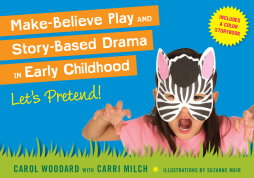
BOOK
Make-Believe Play and Story-Based Drama in Early Childhood
Suzanne Handel Mair | Carol Woodard | Carri Milch
(2012)
Additional Information
Book Details
Abstract
Encouraging imaginative play in the classroom is an effective way to teach young children how to think creatively and interact socially - vital parts of their cognitive, social, and emotional development.
This book presents engaging and practical ways to use drama which will enable young children to develop creative thinking and literacy skills while planning together, making decisions, giving and receiving feedback and working toward a common goal. The reader is guided through introducing and using dramatic play with children, how to integrate drama into everyday classroom activities, and preparing a child-centered story dramatization.
There is a full color, ready-to-use children's storybook included within the book along with instructions on the multiple ways this can be used as a starting point in the classroom.
This is an unbeatable resource for any teacher or trainee teacher wanting to introduce drama into the classroom in a developmentally appropriate way that will benefit all aspects of a child's intellectual and social progression.
In a time when childhood has many detrimental intrusions, this enlightening book offers teachers and parents of young children a new approach to the use of stories with young children. Through the use of dramatization, stories become a vivid tool for learning and holistic development. The reader is shown how the sensual involvement of children immerses them into an expressive world of possibilities. By extending the meaning of stories to include dramatization for young children, Dr. Woodard and Carri Milch have given us a wealthy resource to address the world of make-believe and play. A must-have book for keeping the wonder in childhood.
Christine Ellington-Rowe, Adjunct Instructor for the State University of New York Empire State College, Executive Director of the University at Buffalo Child Care Center and experienced Early Childhood Professional
Teachers of young children who are exasperated by their students' limited ability to express themselves should read Let's Pretend!. This book explains why this is happening and what to do about it. It empowers teachers with a background knowledge of child development and offers many fun activities designed to promote language and literacy skills that can be easily implemented in the classroom.
Stephanie Gregorie, Elementary Education Teacher, Supervisor, Principal and Educational Consultant
Carol Woodard is Professor Emeritus in Early Childhood Education at the State University of New York in Buffalo, New York and has been a visiting professor in China and the Netherlands. She has experience in a variety of early childhood settings and has written books for children as well as professional writings. She lives in East Aurora, New York and consults on early childhood program design for schools, agencies, and businesses. Carri Milch has extensive experience in teaching pre-kindergarten and kindergarten and has conducted district-wide teacher mentoring and workshops. She has also been involved in program development at the state and national levels and lives in Williamsville, New York.
These American authors provide insights and practical advice for introducing dramatic play as part of everyday practice. they emphasise that young children need opportunities to be involved in dramatic play which they create and control, as a precursor to stor dramatization which uses other people's storylines and symbols. In lively style the book outlines how once children have learned a story through re-tellings and have a grasp of the plot and characters, the idea of acting it out can be introduce.
Nursery World
Make-Believe Play and Story-based Drama in Early Childhood: Let's Pretend! is a jewel, an all-inclusive must-have that provides teachers, student teachers and parents with step-by-step strategies to implement make-believe, story pretending and dramatization in early education classrooms. Through theory, practical application and instructive vignettes woven into one idea-packed manual, teachers have a go-to tool box that supports classrooms rich in opportunities for literacy-based learning.
Judy Piskun, Associate Professor and Director of Internships, Villa Maria College, New York
